If you’re a bearded dragon owner, you’ve likely asked yourself this common question: can bearded dragons eat cucumbers? With so many fruits and vegetables available, it’s tempting to assume that anything fresh and green must be healthy for your reptile. But when it comes to cucumbers, the answer isn’t as straightforward as it might seem.
So, can bearded dragons eat cucumbers safely, or are there hidden risks you should know about? In this guide, we’ll break down everything pet owners need to understand about feeding cucumbers to bearded dragons — from nutritional value to potential dangers, and even how to serve them properly if you choose to include them in your dragon’s diet.
By the end of this article, you’ll know exactly when cucumbers are okay, when they should be avoided, and which healthier alternatives you might want to try instead.
What You Should Know Before Feeding Cucumbers to Bearded Dragons
Overview of a Bearded Dragon’s Natural Diet
Bearded dragons are omnivorous reptiles, meaning they eat both plant and animal matter. In the wild, their diet mainly consists of insects, leafy greens, flowers, and occasional fruits. Juveniles tend to eat more protein-rich foods like crickets and roaches to support rapid growth, while adults shift toward a more plant-based diet.
A healthy bearded dragon diet in captivity should mimic this natural balance. This means providing a mix of live insects, such as dubia roaches or mealworms, alongside fresh vegetables and leafy greens. Staple greens include collard greens, mustard greens, and dandelion leaves. These are rich in calcium and low in oxalates, making them safe for daily feeding.
Vegetables should be varied, but not all are safe. Some contain high water content or poor calcium-to-phosphorus ratios. While owners may wonder, can bearded dragons eat cucumbers, it’s essential to first understand their natural dietary needs before offering occasional treats. Replicating what they eat in the wild leads to better health, stronger bones, and a longer life.
Why Researching Individual Vegetables Matters
Not all vegetables are created equal when it comes to feeding your bearded dragon. Some are packed with essential nutrients, while others may contain compounds that can harm your pet over time. That’s why it’s important to research each vegetable before adding it to their diet.
Vegetables like collard greens and butternut squash are excellent choices. They offer calcium, fiber, and vitamins that support bone health and digestion. On the other hand, some vegetables are high in oxalates or have an imbalanced calcium-to-phosphorus ratio. These can lead to health issues like metabolic bone disease if fed too often.
Many owners ask, can bearded dragons eat cucumbers, thinking they’re a harmless option. But cucumbers are high in water and low in nutrients, which means they may not offer the same benefits as other vegetables. Understanding these differences helps you make safer choices for your dragon’s health.
Doing your homework on each vegetable ensures your bearded dragon gets the right mix of hydration, vitamins, and minerals—without unnecessary risks.
Is Cucumber a Typical Part of Their Wild Diet?
In the wild, bearded dragons roam the arid deserts and dry woodlands of Australia. Their natural diet is shaped by the environment—meaning they eat what’s available in their dry, nutrient-scarce habitat. This includes insects, small invertebrates, leafy plants, flowers, and occasional fruits.
Cucumbers are not native to their natural environment. Wild bearded dragons would rarely, if ever, come across cucumbers in the wild. These watery vegetables are more commonly found in cultivated gardens, not in the Australian outback.
Because cucumbers are not part of their typical diet, they don’t offer much in the way of necessary nutrition. While they aren’t toxic, they also lack the essential calcium, fiber, and protein that wild dragons rely on to stay healthy.
So, when asking can bearded dragons eat cucumbers, it’s important to remember that this food is far from their evolutionary norm. Offering it occasionally as a snack is fine, but it should never be a staple. Stick to foods that better match what they’d find in the wild for long-term health.
Nutritional Breakdown of Cucumbers
Water Content and Hydration Considerations
Cucumbers are made up of about 95–96% water. This makes them one of the most hydrating vegetables available. For reptiles like bearded dragons, occasional watery foods can help prevent mild dehydration, especially in warmer environments or after shedding.
However, too much water in the diet can lead to digestive issues. Loose stools, bloating, or even diarrhea may occur if watery vegetables are offered too often. Since these reptiles are adapted to dry habitats, their bodies don’t require frequent high-water foods like cucumbers.
Offering small cucumber slices now and then can support hydration, especially if your pet isn’t drinking from its water bowl. Just be cautious about quantity and frequency. Too much moisture can disrupt a balanced diet and reduce absorption of more nutrient-dense foods.
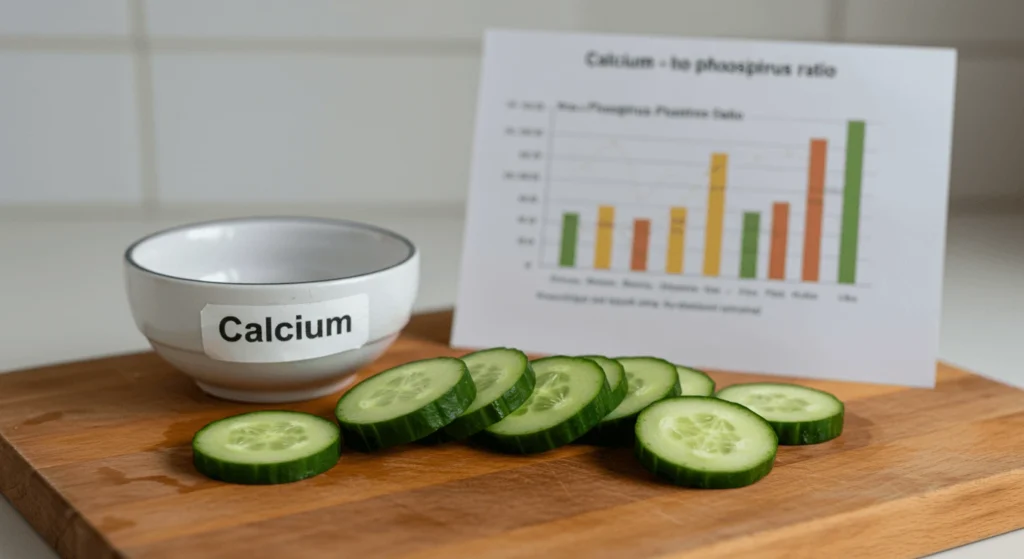
Key Nutrients in Cucumbers (Vitamin C, K, Fiber)
Although cucumbers are low in calories, they do contain a few beneficial nutrients. They offer small amounts of Vitamin C, which supports immune health, and Vitamin K, which plays a role in blood clotting and bone maintenance. They also contain trace amounts of magnesium, potassium, and fiber.
The fiber found in cucumber skin can aid digestion, but it’s very minimal. Since the majority of a cucumber’s weight is water, the nutrient density is quite low compared to other vegetables like squash or dark leafy greens.
For pet reptiles, foods should ideally offer a high return in nutrients per bite. While these nutrients aren’t harmful, they are also not significant enough to make cucumber a valuable dietary staple. It’s fine as an occasional snack, but not as a primary food source.
Oxalates and Calcium-to-Phosphorus Ratio
One of the most important factors when evaluating reptile-safe vegetables is the calcium-to-phosphorus ratio. Ideally, this ratio should be 2:1 in favor of calcium to support strong bones and prevent metabolic bone disease.
Cucumbers have a poor calcium-to-phosphorus ratio, with more phosphorus than calcium. This imbalance can interfere with calcium absorption if cucumbers are fed too often. Additionally, cucumbers contain oxalates—naturally occurring compounds that bind to calcium in the digestive system.
When oxalates bind with calcium, the body can’t absorb the mineral properly. Over time, this can lead to a calcium deficiency, which is especially dangerous for young or breeding reptiles.
To avoid long-term issues, it’s best to treat cucumbers as a treat, not a staple. Always pair occasional cucumber servings with high-calcium greens like collard or mustard greens to maintain dietary balance.
Can Cucumber Impact a Reptile’s Digestive Health?
Cucumbers can affect your reptile’s digestive health, especially if offered too frequently or in large portions. Because they are made up of mostly water and contain very little fiber, cucumbers can cause loose stools or even temporary diarrhea in bearded dragons.
These reptiles are adapted to low-moisture environments. Their digestive systems are not built to handle frequent intake of high-water foods. While small amounts of cucumber may help with hydration, especially during hot weather or mild dehydration, overfeeding can lead to gut imbalances.
In some cases, cucumbers may also cause bloating or mild stomach upset, particularly in younger or more sensitive bearded dragons. A reptile’s diet should focus on fiber-rich greens, balanced calcium, and moderate moisture—not watery vegetables with limited nutrition.
If you choose to include cucumber as a treat, make sure it’s finely chopped and only offered occasionally. Always monitor your dragon’s bowel movements and appetite after introducing any new food.
Are Cucumbers Safe for Bearded Dragons? Pros & Cons
Potential Benefits in Small Quantities
When fed occasionally and in moderation, cucumber can offer minor benefits to your bearded dragon. Its high water content helps support hydration, especially during shedding or in hot weather. This can be useful if your dragon isn’t drinking enough from its bowl or eating juicy fruits.
Cucumber also contains small amounts of vitamins like Vitamin K and Vitamin C, which support immune and bone health. Additionally, the crunchy texture may provide mild enrichment during feeding time.
However, it’s important to note that the benefits are very limited. Cucumbers don’t provide the fiber, protein, or calcium that reptiles need regularly. They are best viewed as a hydrating snack, not a core part of your dragon’s nutrition plan.
Why Too Much Cucumber May Be Harmful
Feeding too much cucumber can lead to several health issues. Its low nutritional value means it can displace more important foods in your bearded dragon’s diet. Over time, this can lead to deficiencies in essential nutrients like calcium, fiber, and protein.
Because cucumber is mostly water, frequent feeding may cause digestive problems like loose stools or diarrhea. This can also lead to dehydration, ironically, if your dragon starts losing fluids too quickly.
Cucumbers also contain oxalates, which bind to calcium in the digestive system. This prevents the body from absorbing it effectively, raising the risk of metabolic bone disease—a condition especially common in certain dragon morphs like Silkbacks and Translucents. Learn more about morph-related health risks here.
So, while the vegetable isn’t toxic, it can become harmful if overused or offered in large amounts. Balance is key.
Vet Advice on Feeding Frequency
Most exotic animal vets agree that cucumber should only be an occasional treat for bearded dragons. It’s not recommended as a staple vegetable, and it shouldn’t appear in their weekly rotation of greens and veggies.
A safe frequency is around once every two to three weeks, and only in small portions. This ensures your dragon receives some hydration without the risk of disrupting their digestive health or calcium levels.
Veterinarians also advise pairing cucumbers with high-calcium greens like collards or turnip greens. Doing this can help reduce the calcium-binding effect of oxalates.
If your dragon has shown signs of digestive upset, bloating, or diarrhea after eating cucumber, it’s best to remove it entirely and consult a reptile-savvy vet. Consistent monitoring and diet variety are always the best strategies.
Raw vs. Cooked: What’s Best for Reptiles?
Cucumber should always be served raw to bearded dragons. Cooking it removes what little nutritional value it has and increases water content further. Cooked vegetables also become too soft, removing any potential textural benefit for your pet.
Raw cucumber, when thinly sliced or chopped, is easy for reptiles to chew and digest. Make sure to remove the seeds and peel for younger dragons, as these parts can be hard to digest or may contain pesticide residue if not organic.
Avoid seasoning or mixing cucumbers with oils or dips. Reptiles need clean, unprocessed foods to stay healthy. Stick to raw, fresh, and pesticide-free cucumber if you choose to offer it.
How to Feed Cucumbers Properly (If You Choose To)
How to Prepare Cucumber for Bearded Dragons
Preparation makes a big difference in how safe and digestible cucumber is for your bearded dragon. Always start by choosing fresh, pesticide-free cucumbers. If possible, opt for organic to reduce chemical exposure.
Wash the cucumber thoroughly under running water. Peel the skin if you’re unsure about pesticide use, as the skin tends to hold residue. Remove all seeds — they can be difficult to digest and offer no nutritional value.
Slice the cucumber into very thin, bite-sized pieces. For young dragons or those new to cucumber, consider cutting it into soft shreds to make chewing easier.
Never cook or season the cucumber. Bearded dragons require plain, raw produce to stay healthy. Serve cucumber on a clean plate or mix it with high-calcium greens to improve nutrient balance.
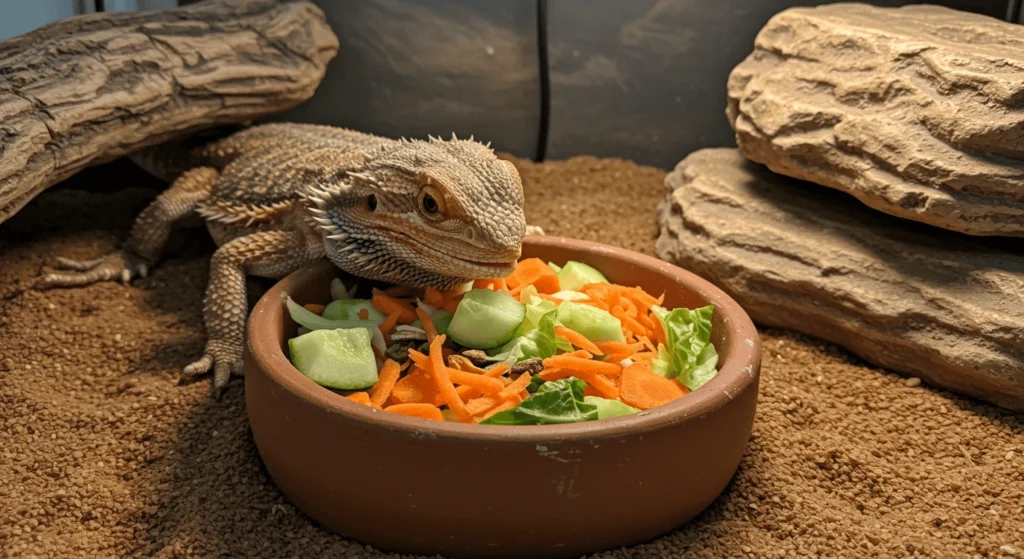
Best Portion Sizes and Feeding Frequency
Cucumber should only be given in very small portions. A few thin slices or cubes — no larger than the space between your dragon’s eyes — are more than enough. The key is moderation.
Feeding cucumber once every 2 to 3 weeks is typically safe for healthy adult dragons. This occasional treat can provide hydration without interfering too much with their nutrient intake.
Avoid adding cucumber to your dragon’s regular feeding rotation. It should never replace essential foods like calcium-rich greens or protein-rich insects. Overuse may lead to nutritional imbalances or soft stool.
If your dragon eats too much cucumber in one sitting, skip watery vegetables for several days to allow their digestion to reset.
Can Baby Bearded Dragons Have Cucumber?
Baby bearded dragons have more sensitive digestive systems and higher nutritional needs. They require extra calcium and protein for proper growth. Because cucumbers are low in both, they are not recommended for babies.
Occasionally offering a tiny sliver of cucumber to a baby dragon is unlikely to cause harm, but there’s little to no benefit. Instead, focus on foods that support development — like gut-loaded insects, collard greens, and squash.
If you do introduce cucumber at a young age, do so rarely and always observe how your dragon reacts. Any changes in stool, appetite, or behavior should be taken seriously.
It’s safest to wait until your bearded dragon is older before introducing low-nutrient foods like cucumber. Nutrition during their first 12 months is critical.
Signs of Overfeeding or Poor Reaction
Feeding too much cucumber can lead to noticeable digestive problems. Loose stool, runny urates, and mild bloating are common signs that your dragon’s diet contains too much water.
In some cases, you may also notice a loss of appetite or lethargy. This can happen when low-nutrient foods like cucumber fill them up, leaving no room for the essential calcium and protein they need.
Watch for behavioral changes after feeding. If your dragon avoids food, appears uncomfortable, or isn’t basking normally, reevaluate their recent meals.
Always feed cucumber in moderation and use it as a minor supplement to a balanced diet. When in doubt, consult a reptile-savvy veterinarian for guidance.
Healthier Alternatives to Cucumber in a Bearded Dragon’s Diet
Top Reptile-Friendly Vegetables (Collard Greens, Squash, etc.)
When it comes to vegetables, some options are far better suited for your bearded dragon’s health than cucumber. Collard greens, mustard greens, and dandelion greens are among the most recommended staples. They’re rich in calcium, low in oxalates, and have an excellent calcium-to-phosphorus ratio.
Other great options include butternut squash, acorn squash, and zucchini. These are more nutrient-dense, offering fiber, beta-carotene, and moderate moisture levels without overwhelming your dragon’s system.
Variety is key. Rotating these vegetables helps prevent boredom and ensures a broad spectrum of vitamins and minerals. Unlike watery vegetables like cucumber, these alternatives actively contribute to bone health, digestion, and overall vitality.
What Fruits Are Safe in Moderation?
Fruits should only make up a very small part of a bearded dragon’s diet, but they can be a great treat when offered sparingly. Safe choices include blueberries, papaya, figs, mango, and raspberries — all of which provide natural sugars, antioxidants, and hydration.
The key with fruit is moderation. Too much sugar can lead to obesity, digestive issues, and even yeast overgrowth in reptiles. Offer fruit just once or twice a week, and always remove seeds, pits, and peels.
Avoid citrus fruits like oranges and lemons, as they’re too acidic. Grapes and bananas should also be limited due to sugar and phosphorus levels.
You can occasionally add tiny fruit slices to salads for variety and scent stimulation, but vegetables should remain the focus of your dragon’s plant-based intake.
Balancing Calcium and Hydration in Diet
Striking the right balance between hydration and mineral intake is essential for long-term health. Bearded dragons need consistent hydration, but they also require foods that support calcium absorption and bone strength.
Leafy greens such as turnip greens and endive offer moisture while supplying calcium and other nutrients. Vegetables like squash add both hydration and digestible fiber without contributing to oxalate overload.
Avoid overloading on high-water foods like cucumber or iceberg lettuce. While they hydrate, they dilute nutrient intake and may disrupt digestion.
For added support, dust feeders and vegetables with calcium powder a few times a week. Also, ensure a shallow water dish is always available, even if your dragon rarely drinks directly from it. Balanced hydration and calcium keep your dragon active, strong, and thriving.
When to Consult a Reptile Vet About Diet
Even with careful planning, it’s not always easy to know if your bearded dragon’s diet is meeting all their needs. If you notice symptoms like lethargy, swollen limbs, constipation, soft bones, or loss of appetite, it’s time to consult a reptile-specialized veterinarian.
A vet can check for nutrient deficiencies, review your dragon’s feeding routine, and recommend supplements or dietary changes based on their age and health status.
Routine checkups are also helpful during growth spurts, brumation cycles, or if you’re planning to breed. For baby dragons, frequent vet guidance ensures their diet supports proper development.
It’s always better to catch diet-related issues early. Partnering with a qualified exotic vet gives your dragon the best chance at a long, healthy life.
Frequently Asked Questions
Can bearded dragons eat cucumbers every day?
No, bearded dragons should not eat cucumbers daily. While cucumbers are not toxic, they’re low in essential nutrients and high in water. Feeding them too often can lead to digestive issues like diarrhea and reduce calcium absorption, increasing the risk of metabolic bone disease. Offer cucumber only as an occasional treat—about once every two to three weeks is considered safe.
Can bearded dragons eat cucumber seeds?
It’s best to remove the seeds before feeding cucumber to your bearded dragon. Cucumber seeds are soft but can be difficult to digest and may cause mild digestive discomfort or even choking in younger reptiles. Always serve cucumber in small, seedless slices to make it safe and easy to eat.
Can bearded dragons eat tomatoes?
Bearded dragons can eat small amounts of ripe tomato occasionally. Tomatoes are acidic and contain more phosphorus than calcium, so they shouldn’t be a regular part of their diet. Avoid green or unripe tomatoes, which can be toxic. Serve tiny, peeled pieces no more than once every few weeks.
Can bearded dragons eat cucumber skin?
Cucumber skin can be fed to adult bearded dragons, but only if the cucumber is organic and pesticide-free. The skin contains some fiber, but it’s also tougher to digest. For younger dragons or store-bought cucumbers, it’s better to peel the skin to avoid pesticide residue and digestive strain.
Can bearded dragons eat cucumbers and tomatoes?
Yes, but both should be offered rarely and in small amounts. Cucumbers and tomatoes are low in nutritional value and high in water or acidity, which can upset digestion. Combining them occasionally is fine, but they should never replace staple greens like collard or mustard greens in your dragon’s diet.
Can bearded dragons eat carrots?
Yes, carrots are safe for bearded dragons in moderation. They’re rich in Vitamin A (as beta-carotene) and add color and crunch to the diet. However, too much Vitamin A can lead to toxicity, especially if your dragon is already on supplements. Feed shredded or finely chopped carrots once or twice a week at most.
Can bearded dragons eat zucchini?
Zucchini is a safe vegetable for bearded dragons and can be offered more often than cucumber. It’s low in oxalates and phosphorus, but also not very nutrient-dense. Serve raw, peeled, and finely chopped. It pairs well with high-calcium greens to create a more balanced meal.
Can bearded dragons eat peaches?
Peaches are safe in small, occasional servings. They’re high in sugar and should be treated as a treat, not a staple. Remove the pit and skin, and offer tiny soft slices. Too much fruit, including peaches, can cause digestive upset or blood sugar spikes in reptiles.
Conclusion
While cucumbers aren’t harmful in small amounts, they offer little nutritional value for bearded dragons. Their high water content and poor calcium ratio make them best suited as an occasional treat—not a regular part of your pet’s diet. By focusing on nutrient-rich vegetables and keeping treats like cucumber in moderation, you’ll help your bearded dragon stay healthy, active, and thriving.

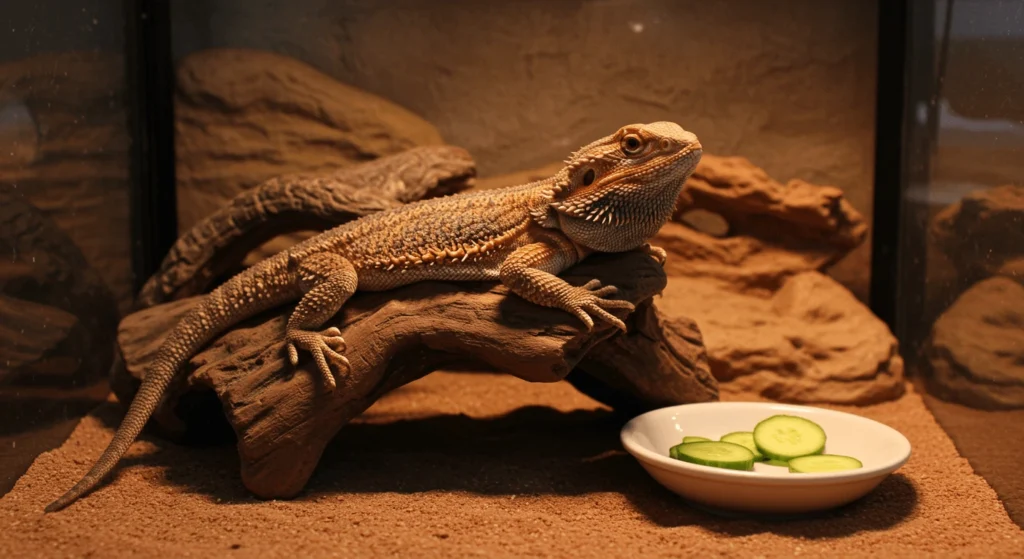
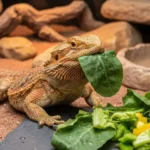
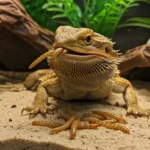
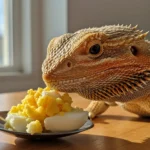
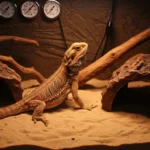
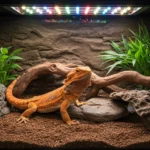
2 thoughts on “Can Bearded Dragons Eat Cucumbers? Full Guide for Pet Owners”